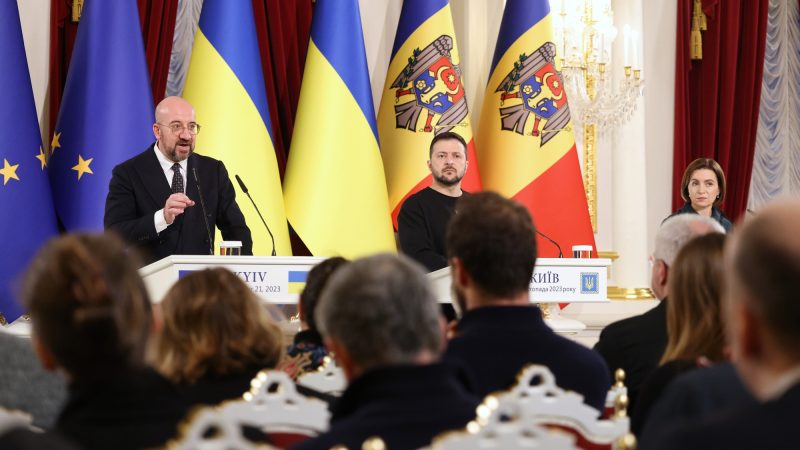Top priority

With Ukraine’s and Moldova’s hopes for an opening of EU accession talks taking centre stage in Kyiv on Tuesday (21 November), European Council President Charles Michel sought to reassure them that the matter remained a priority for the bloc, despite warnings of a tough decision at the EU December summit, EUROACTIV informs.
“The entry of Ukraine and Moldova into the EU is a strategic interest of ours and I will do everything possible to ensure that the European Council starts negotiations in December,” European Council President Charles Michel said in Kyiv, speaking alongside Ukrainian President Volodymyr Zelenskyy and Moldova’s President Maia Sandu.
Over the past year, both countries have been carrying out a series of reforms to win over EU members and advance their respective paths. EU leaders will hold a summit in Brussels on 14-15 December where they will discuss whether to greenlight the start of the two Eastern Partnership countries’ accession talks.
Michel’s unannounced trip three weeks before came as Ukraine marked 10 years since the start of mass protests that toppled Russia-backed President Viktor Yanukovych and set Kyiv on a resolute pro-Western course.
EU's Michel lands in Kyiv as bloc looks at tough battle on Ukraine aid, accession talks
European Council President Charles Michel arrived in Kyiv on Tuesday (21 November) on yet another reassurance mission by a high-ranking EU official, just three weeks before a decisive end-of-year EU summit over support to Ukraine.
“The opening of negotiations would send the message that the EU can be trusted and at the same time it would be a message of unity towards the Kremlin,” Michel said.
“Ten years ago the Ukrainians rebelled to say yes to freedom and to Europe, against corruption and for the rule of law: it is a date that will go down in the history of our continent,” he added, referring to the start of Euromaidan protests in 2013.
Standing alongside Zelenskyy and Sandu, Michel appeared combative saying he would “do everything to convince the [EU]27 to reach a positive decision” in December.
But with high hopes in Kyiv and Chişinău and an increasingly bleak outlook from Brussels, as EU officials have been voicing concern that the political decision to launch the talks next month could be “at risk”.
“I would like the opening of accession negotiations with Ukraine to be based on concrete facts, we do not expect gifts and we understand that this is a process of merit,” Zelenskyy said.
He added that the decision to start negotiations on Ukraine’s accession to the EU in December would be “motivating” and “mobilising” for Ukrainians.
“We respected the seven recommendations 100% and this decision would (…) show that we defend our values with facts and not just with words: I wish we would not give an extra victory to Vladimir Putin,” he added.
The measures include expanding the staff of Ukraine’s National Anti-Corruption Bureau and strengthening safeguards for the anti-corruption prosecutor.
“We must act with one voice, showing that our collective will is unbreakable,” Sandu said, stressing again that both countries believe that “the European Union does not want to give Putin the right of veto in the European Union”.
Both Zelenskyy and Sandu vowed to continue work on reforms.
With Michel in town, Ukraine’s parliament gave preliminary approval on Tuesday for several key anti-corruption legislation bills which had been recommended by Brussels to bolster Ukraine’s fight against corruption.
Those words might have been also partly directed at Hungary, whose Prime Minister Viktor Orbán over the past weeks had displayed an increasingly complacent attitude towards Russia and increased hostility towards Kyiv by threatening to stall its accession process as well as continuing to delay EU military and financial aid.